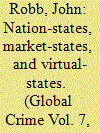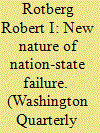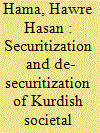| Srl | Item |
| 1 |
ID:
070077


|
|
|
| 2 |
ID:
073413


|
|
|
| 3 |
ID:
077331


|
|
|
|
|
| Publication |
2006.
|
| Summary/Abstract |
The advent of a global economic and physical superinfrastructure is in the process of transforming terrorism, guerrilla warfare, and the nation-state. A useful model for understanding this process of transformation is Philip Bobbitt's work, "The Shield of Achilles." Bobbitt's work demonstrates that the nation-state is in a difficult and dangerous process of transition to a new form of governance, called the market-state, that is built to withstand and prosper despite the pressures of globalization. This process is complicated by the emergence of a vicious asymmetric competitor, in the form of a virtual state that leverages the huge flows of the global criminal economy, combined with the weakness of the nation-state during its phase transition to the market-state. This essay details the structure of this conflict and provides a scenario for its potential outcome
|
|
|
|
|
|
|
|
|
|
|
|
|
|
|
|
| 4 |
ID:
021685


|
|
|
|
|
| Publication |
Summer 2002.
|
| Description |
85-96
|
|
|
|
|
|
|
|
|
|
|
|
|
|
|
|
| 5 |
ID:
189554


|
|
|
|
|
| Summary/Abstract |
Early mapping of Himalayan frontiers, were intimately tied to the imperial conquest of space. Polycentric contestations of the British, Russian, Qing and even Tibetan expansionist imaginaries dominated such territorial endeavours. In the mid-twentieth century, in the switch from empire to nation, scholarship on borders and borderlands reinforced methodological nationalism in spaces with multiple sovereignty and overlapping treaties. While early post-colonial scholarship critiqued the colonial construction of borders, there have been efforts to tease out newer ways of narrating borders that take cognisance of the continuing heterarchies of violence in the modern nation. Such scholarly ‘decolonial’ endeavours have challenged the overwhelming emphasis on state and territoriality in colonial and later national accounts on borders. By imagining the Himalayan transregional frontier as central, rather than peripheral to state making, these notes challenge the cultivation of the Himalayas as culturally, even civilisationally ‘primitive’. Conceptualising the borderland as an epistemic category, these survey notes synthesise more recent decolonial scholarship on Himalayan borders and borderlands to sketch out emerging geographies of (im)mobility, militarisation and violence.
|
|
|
|
|
|
|
|
|
|
|
|
|
|
|
|
| 6 |
ID:
184232


|
|
|
|
|
| Summary/Abstract |
The four countries hosting Kurdish populations in the Middle East have mainly been politically centralized in character and sought to follow a homogeneous nation-state model through the assimilation of their Kurdish communities. Drawing on the concepts of societal security, securitization, and de-securitization derived from the theories of the Copenhagen School, this article examines Kurdish (in)security in the Middle East and argues that the Kurds have experienced significant societal insecurity due to the adoption of assimilation strategies by their host states. I posit that federalism and power sharing are the two obvious de-securitization strategies that may address the securitization of Kurdish identity in the states with significant Kurdish populations. I further argue that, while the federal model has appeared to manage securitized Kurdish identity in Iraq since 2003, this solution may not be applicable to Turkey, Iran, and Syria. Alternatively, consociational power sharing as a form of institutional de-securitization carries the potential to address Kurdish identity in these countries.
|
|
|
|
|
|
|
|
|
|
|
|
|
|
|
|